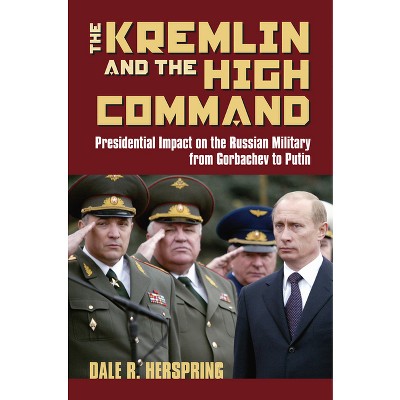Sponsored

Waging War in Waziristan - (Modern War Studies) by Andrew M Roe (Hardcover)
In Stock
Sponsored
About this item
Highlights
- Waziristan is a remote district of Pakistan populated by fiercely independent tribes who owe allegiance to no one and unite only to repel invaders or wage jihad.
- Author(s): Andrew M Roe
- 324 Pages
- History, Military
- Series Name: Modern War Studies
Description
About the Book
A career soldier with on-the-ground experience presents a gripping history of the imperial British experience in Waziristan, a remote area of Pakistan. Distills the hard-earned British experience and offers some potentially useful lessons for the West and its current troubles in the same region--once described as the "epicenter of terrorism" and reputedly the hiding place of Osama bin Laden.Book Synopsis
Waziristan is a remote district of Pakistan populated by fiercely independent tribes who owe allegiance to no one and unite only to repel invaders or wage jihad. Its mountainous landscape is a natural fortress-sanctuary to the Taliban, probable refuge of Osama bin Laden, and widely regarded as the "epicenter of terrorism." Waziristan is as much a powder keg today as it was when India was part of the British Empire. It was here that the infamous Fakir of Ipi waged guerrilla warfare against the foreigners and evaded the 40,000 troops sent to capture him. In this very timely book, Andrew Roe captures the essence of Waziristan's tribal culture, explains how the British managed to contain this volatile area, and provides new insight into why Bin Laden chose to hide there. Roe, a career soldier with on-the-ground experience in the region, distills the hard-earned lessons gained by the British. He explains how they sought to counter Russian expansionism in Central Asia, which was seen as a threat to tribal autonomy in India's North-West Frontier; he then tells how they pursued a policy of containment rather than control by working through indigenous forces and utilizing a combination of incentives and force to subdue and appease the tribal areas. Roe persuasively argues that many of the measures that were effective in pacifying the region in the past are equally applicable today. He stresses the importance of using force as a last resort and of harmonizing political and military activities. His bottom line: the British solutions to similar problems in the same geographical area, even though from a different era, have considerable utility for today's policymakers and military commanders in this region. Offering valuable insights, Roe's work shows how the British (long before "counterinsurgency doctrine" was embraced) grew to understand whom they were dealing with and what was possible and revised their aims accordingly--lessons the United States and its allies could well heed. At a time when the situation in southern Afghanistan is increasingly perilous, the British approach to tribal management offers useful guidance for the governments of Pakistan and Afghanistan and the international community in their attempts to deal with today's challenges.Review Quotes
"An excellent account of British tribal management through subtle containment, not direct control. A must-read that has application for coalition planners and governments, particularly in Afghanistan and Pakistan. Strongly recommended to planners, historians, and military professionals alike."--Military Review
"A book of substance that should appeal to historians, military professionals, and policy planners."--Joint Force Quarterly
"Issues that were identified sixty and seventy years ago remain relevant--the difficulty of distinguishing combatants from noncombatants; the difficulty of balancing an aircraft's operational altitude with the aircraft's vulnerability and alerting enemy fighters on the ground because of aircraft noise; and the limits on the effective use of such aircraft due to weather and terrain. It was also extremely difficult to distinguish between hostile and peaceful villagers as well as government forces."--Army History
"A timely study."--American Historical Review
"The book provides an excellent introduction into the geography and tribal culture of Waziristan, together with valuable insights into the British 'Forward' strategy of the day. . . . This is a first class account, extensively researched from both primary and secondary sources and as such, is essential reading for all those destined to become involved in this intractable of wars."--The British Army Review
"Recommended for readers in military or social history on the region."--Library Journal
"A masterful and timely history that should be required reading for those policy makers charting the way forward in Afghanistan and Pakistan today. Roe argues convincingly that history and culture matter a great deal in the wars of the 21st century--and we can either pay attention to their lessons or suffer the consequences."--Peter Mansoor, author of Baghdad at Sunrise: A Brigade Commander's War in Iraq
"A good book on Waziristan is long overdue. What happens there has an impact on Afghanistan, Pakistan, and beyond. As someone who has served in Waziristan, I am grateful for Roe's authoritative study."--Ambassador Akbar S. Ahmed, author of Journey into Islam: The Crisis of Globalization
Shipping details
Return details
Trending Non-Fiction

















